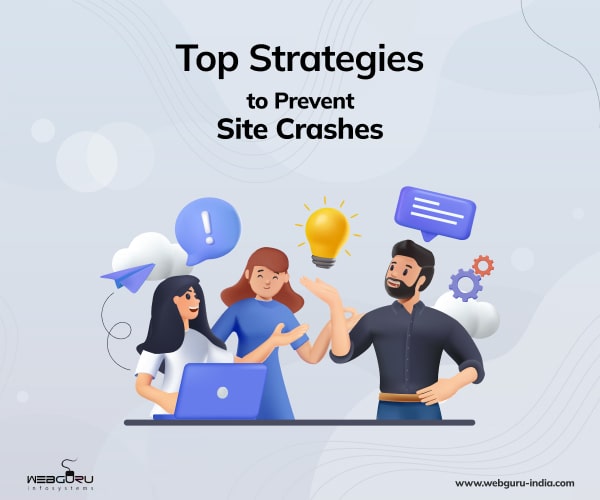Home Blog Website Development 5 Ways to Prevent Site Crashes During Sales Season
5 Ways to Prevent Site Crashes During Sales Season
- 27 Nov / 2024
- 985 views
- 9 Min Read

Sales seasons generate traffic surges that may incapacitate your website, resulting in lost sales and customers. And that’s why it’s important to improve the health of your site so that it can work well under pressure. Prioritize optimizing speed, implementing load balancing, conducting stress tests, scaling hosting, and engaging in real-time monitoring to ensure your site navigates peak demand seamlessly. Collaborating with a seasoned website development company can help you implement these solutions efficiently so that your site remains stable and poised for high-traffic events.
Can you believe online marketplaces sold items worth $6.5 billion in just one week of festive sales? Or can you imagine for the 2024 holiday season, Amazon alone was projected to generate 112.3 billion U.S. dollars in sales?
Both stats highlight the incredible opportunities in this sector and can inspire modern eCommerce business owners.
The sales season is one of the most critical times of the year for eCommerce businesses. These events define the success of an eCommerce platform. Whether it’s Black Friday, Cyber Monday, or any other time of the year with a sale, digital merchants must be ready for the massive influx of traffic. An unexpected rise in traffic can overload a website’s systems, causing delays, crashes, or even a total shutdown. Such problems can lead to lost revenue, damaged brand reputation, and frustrated customers.
Effective Tips to Prevent Site Crashes During Sales Season
Site crashes during the sale season are the nightmare for all eCommerce businesses out there. And this nightmare can turn into a reality if they are not prepared well. There are multiple ways to prevent such a heartbreaking situation; partnering with an efficient website development company can help you implement the right strategies.
1. Optimize Website Performance for Speed
Website speed significantly influences user experience, particularly during the sales season when traffic surges; slow loading times can frustrate visitors, prompting them to abandon their shopping carts and exit the site. A mere one-second delay in page load time can lead to a 7% decrease in conversions. This represents a substantial setback for any eCommerce enterprise, particularly during sales events when every moment is critical.
To prevent slowdowns, optimize your website for speed by compressing images, minimizing HTTP requests, and employing browser caching; additionally, eCommerce platforms should implement a content delivery network (CDN) to ensure rapid content delivery, particularly for customers in diverse geographical locations. An eCommerce website development company can assist you in implementing these performance optimization techniques, ensuring your site maintains its speed and responsiveness even amidst substantial traffic.
2. Implement Load Balancing
Load balancing is like setting multiple checkout counters in a physical store. Instead of letting all customers use a single entrance, it distributes incoming traffic across several servers. Thus, you can prevent any single server from becoming overwhelmed and crashing under heavy load.
Key implementation steps:
- Set up multiple server instances across different geographic locations
- Configure automatic traffic distribution
- Implement health checks to detect and bypass failing servers
- Use cloud-based load balancing solutions for scalability
3. Optimize Database Performance
Your database is the backbone of your eCommerce platform. During sales events, an eCommerce store needs to handle thousands of simultaneous transactions without buckling under pressure. Here are some key optimization techniques that a website development company can take care of for your site:
- Implement database caching
- Index frequently accessed data
- Optimize database queries
- Set up database replication
- Regular maintenance and cleanup of unnecessary data
4. Stress Test Your Site Before Sales Events
Stress testing is one of the ideal ways to identify potential issues in the system before they turn into a real problem. Via the stress test, you can simulate high traffic loads on your site and check how well it performs under stress. Conducting stress testing well in advance can help you identify bottlenecks in your site’s infrastructure and make the required adjustments.
For example, stress tests can help identify pages that load slowly, plugins or features that consume too many resources, and at which point your eCommerce site experiences crashes. Also, don’t forget to test payment gateways to ensure they can handle a large volume of transactions during the sales season.
5. Ensure Your Hosting Infrastructure Can Scale
Your website’s ability to manage increased traffic largely depends on the quality of your hosting infrastructure. While shared hosting plans are wallet-friendly, they might struggle with high traffic during peak sales seasons. This could cause slow loading times or even result in a total crash of your website.
To stop this, you might think about investing in a hosting solution that can scale with your requirements. Dedicated hosting, cloud hosting, or VPS hosting could provide more control, flexibility, and the capacity to manage growing traffic. A lot of cloud-hosting providers give auto-scaling features that add server resources automatically when there is high traffic, making sure your site stays reachable even at times of strong demand.
A website development company can evaluate your hosting infrastructure and make necessary upgrades to ensure that your website has the resources needed to handle the sales season without crashing.
Bonus Tips:
- Monitoring in real-time is very important to spot and solve problems before they turn into a big crisis. By utilizing tools that keep track of your website’s analytics and server condition, you have the ability to recognize issues with performance, threats to security, or traffic congestion as they occur.
Google Analytics, along with server checking tools such as New Relic and Datadog, gives information about website performance, where traffic is coming from, and how much load the server is handling in actual time. These tools can also send alerts when performance levels are surpassed to let your team solve problems right away. - A prevalent reason for deserted carts in sales events is a complex or sluggish checkout process. A site crash is not the sole problem that could repel customers; vexing checkout experiences have similar effects. Make certain your checkout procedure is adjusted to be fast and easy, with few steps necessary to finalize a purchase. This will enhance the rate of conversions and prevent customers from abandoning their carts due to delays.
Conclusion
The sales season poses a critical challenge for eCommerce businesses, and a website crash could lead to significant revenue loss and harm to brand reputation. However, implementing these strategies can help prevent site crashes and maintain stability during peak traffic periods.
Collaborating with a seasoned website development company is essential for the effective implementation of these strategies, as a professional development team evaluates your website’s performance, enacts requisite enhancements, and offers continuous support to prepare your site for the sales season; thus, by investing in the appropriate technical infrastructure, you can facilitate a seamless and prosperous sales period, enhancing both revenue and customer satisfaction.

Sujata Bhattacharjee
Sujata Bhattacharjee is a versatile content writer with a passion for crafting engaging narratives. Her work blends creativity with expertise, captivating readers across diverse topics effortlessly.
1 comment
Leave a Reply

-
1000+
Happy
Clients -
25+
Countries
Served -
19+
Years of
Trust








This is a great article about preventing site crashes! It’s really helpful to see the different ways to prepare for high traffic. Thanks for the great post!